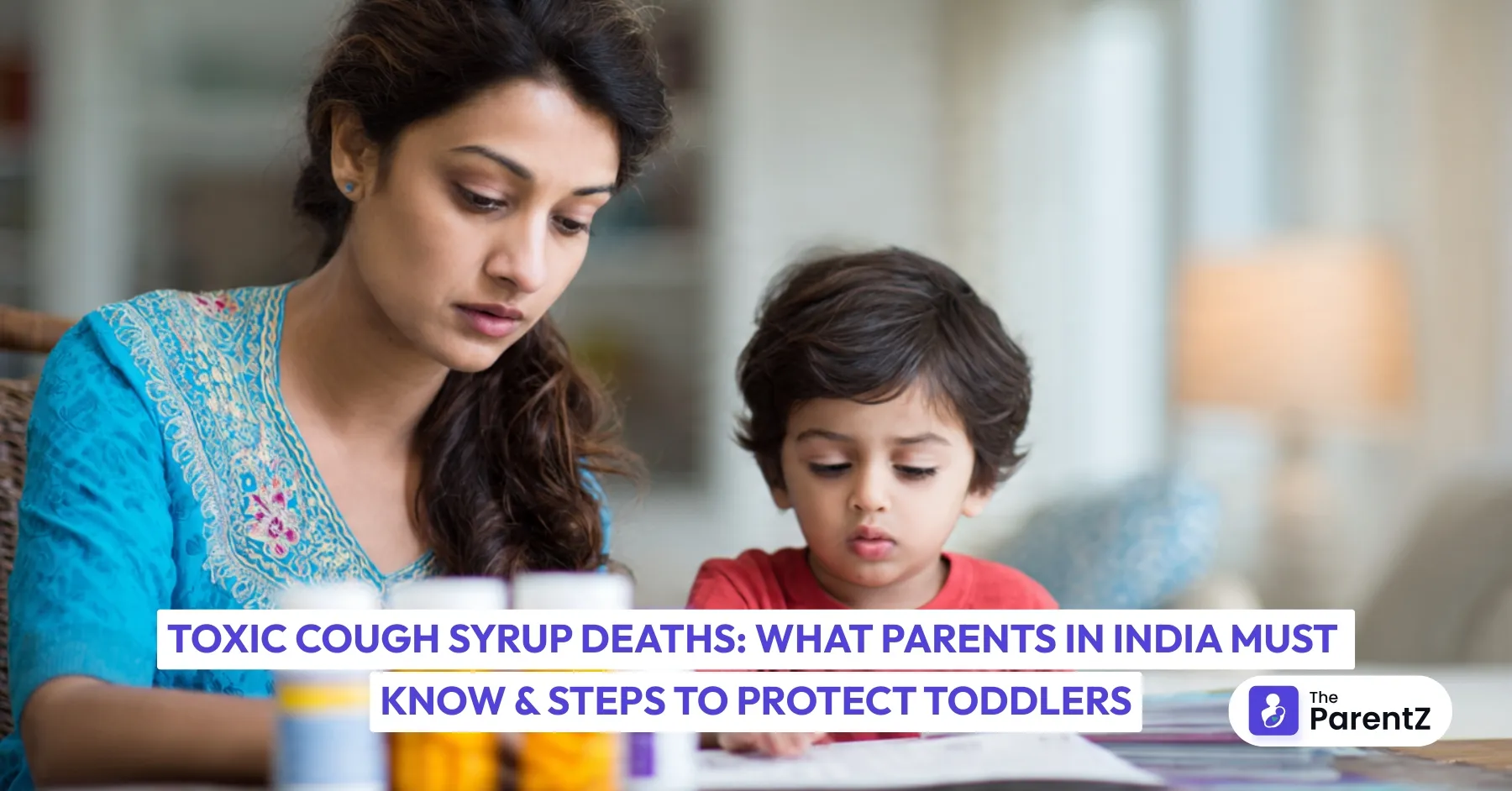Imagine your child has a mild cough. You go to the chemist, pick a syrup you believe is safe, and give it to them, only to discover days later their kidneys are failing. It’s horrifying. But that is exactly what’s been happening in parts of India recently. In Madhya Pradesh, Rajasthan, and other states, toddlers who were given a common cough syrup began developing signs of kidney failure, and many tragically died. Officials later detected diethylene glycol (DEG), a toxic industrial chemical, in that syrup.
What Are the Facts: What’s Going On?
Recent Tragedies
- In Madhya Pradesh’s Chhindwara district, several children aged 1 to 6 died within days after being given a cough syrup. Many showed signs of rapidly worsening kidney injury.
- Tests on the suspected syrup batch (brand name Coldrif, from Sresan Pharmaceuticals, Tamil Nadu) found alarmingly high levels of diethylene glycol, about 48.6%, while the safe limit is less than 0.1%.
- A police complaint says that so far, at least 14 children have died, and many more are hospitalized with severe renal (kidney) problems.
- Authorities have launched manslaughter investigations, banned the medicine, seized stocks, and intensified inspections of multiple pharmaceutical units across states.
Why This Happens: The Science and System Failures
What is Diethylene Glycol (DEG)?
DEG is an industrial solvent used in antifreeze, plastics, and other non-food uses. It should never be in medicines. But when raw materials like propylene glycol (used in syrups) are substituted with cheaper industrial-grade variants, DEG contamination slips in.
How It Hurts Kids?
Once ingested, DEG is metabolized into toxic compounds that attack the kidneys (acute kidney injury), sometimes also affecting the liver and nervous system. Early signs include stomach pain, vomiting, reduced urine, lethargy, dark urine, swelling, and, in severe cases, seizures or death.
Regulation & Oversight Gaps
- Some manufacturers skip or poorly perform quality checks for DEG in raw materials or final syrups.
- In India, export batches of cough syrups are now required to be tested in government labs, but the same stringent rules do not always apply to those sold domestically.
- Some small‐scale producers may lack advanced equipment like gas chromatography (needed to detect DEG accurately).
- Supply chains are complex; contaminated batches may reach remote areas before recall or bans take effect.
- The record‐keeping, inspection, and recall mechanisms are weak in parts of our system.
Historical & Global Precedents
- This isn’t a one-time incident. In 2022, Indian-made syrups contaminated with DEG caused at least 70 child deaths in The Gambia.
- In Uzbekistan, about 18 children died from syrups made by Indian manufacturers.
- Such tragedies show that the problem is not confined to India, but the Indian drug system has to be held accountable because many of these syrups originate here.
Why This Hits Toddlers Especially Hard
- Toddlers have small bodies and immature organs; even a small amount of DEG relative to their weight can overwhelm their kidneys.
- They can’t always verbalize symptoms. By the time signs appear, damage may already be advanced.
- Their immune systems and organs are still developing.
- Parents, trusting in “common” medications, may delay recognizing that something is seriously wrong.
What Parents Must Do: Practical Steps to Protect Your Child
1. Avoid Unnecessary Cough Syrups
- Many coughs in children are viral and self-limiting; they often improve in 3–7 days with rest, fluids, and home care.
- Syrups do not shorten the illness; at best, they ease symptoms temporarily.
- Never give a cough syrup unless a licensed pediatrician prescribes one and you believe the doctor is careful.
2. Check Before You Buy / Administer
Whenever a syrup is prescribed or offered:
- Ask for the batch number, manufacturing license, and expiry date. If the shop cannot provide, be cautious.
- Check whether the brand has been banned or flagged recently. (News and health ministry updates matter.)
- Ask the doctor whether that brand is safe and well-tested.
3. Stay Alert to Early Warning Signs
If your child was given a cough syrup or medicine recently, watch for:
- Reduced or very little urine output
- Swelling in the face, hands, and legs
- Dark or colored urine (tea‐colored)
- Abdominal pain, vomiting
- Extreme fatigue, loss of appetite
- Unusual drowsiness or confusion
If any of these appear within a few days after a medication, seek immediate medical attention. Tell the doctor that the child recently took medicine and ask for kidney function tests (blood urea, creatinine, etc.).
4. Push for Lab Tests / Second Opinions
- If the doctor is dismissive, ask for a referral to a pediatric nephrologist (kidney specialist).
- Request that the medicine be tested if suspicion is strong and encourage doctors to report to regulatory bodies.
- Keep all medicine wrappers, containers, and boxes, as they may help in the investigation.
5. Raise Awareness Locally
- Talk to other parents, local health workers, and local pharmacists about these risks.
- Insist your local clinic stocks safe, inspected medicines.
- Demand that health authorities recall suspected lots promptly.
6. Use Alternatives When Possible
- For cough: use humidity (steam inhalation, warm mist), plenty of fluids, rest, gentle suction for infants’ noses, and saline nose drops.
- Use safer forms of medicines (pills or suspensions) that don’t require problematic solvents, but only under a doctor's guidance.
- Ensure your child has good nutrition, hygiene, and prompt medical attention for infections so coughs don’t worsen.
A Note of Caution: Be Rational but Vigilant
We don’t want you to panic. Not every syrup is dangerous. Many manufacturers follow rules, make safe medicines, and care deeply. But the broken ones have caused deaths. The system is waking up. The bans, investigations, and FIRs are real.
What you can do is combine care with alertness. Don’t assume everything is safe. Ask questions. Trust your gut. If something doesn’t feel right, push for checks or get another opinion.
Conclusion
This toxic cough syrup crisis is a warning bell. It tells us that medicines, even trusted ones, can turn dangerous if oversight is weak. As parents, we often feel powerless, but we are not. Your vigilance, questions, and insistence on safety can make the difference.
Protecting your toddler from cough syrup deaths isn’t about fear. It’s about being informed, cautious, and empowered. Let’s make sure that no parent needs to suffer the agony of losing a child to something that should have cured them.





Be the first one to comment on this story.